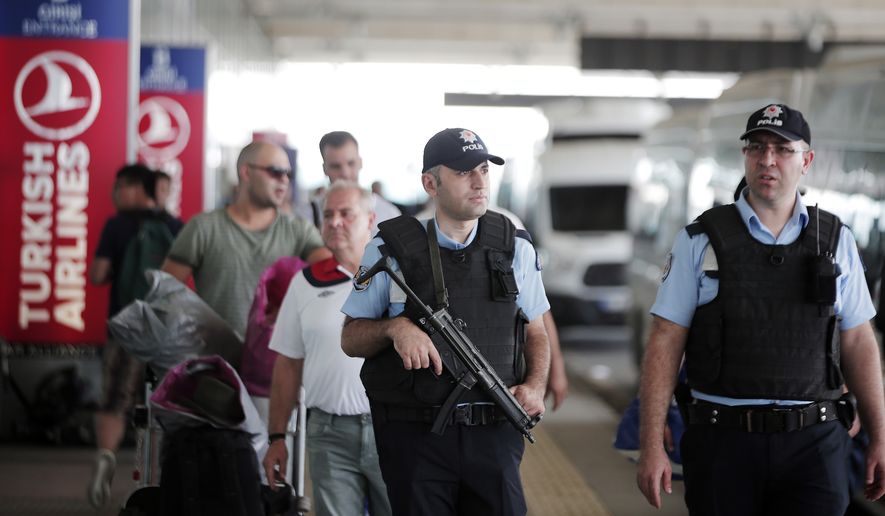Defense Secretary Ashton Carter personally condemned Tuesday’s brutal terrorist attack in Istanbul, vowing to provide the Pentagon’s resources to support Turkey’s ongoing counterterrorism efforts against Islamic State.
Mr. Carter characterized the attack as “a cowardly assault on a stalwart NATO ally and enduring partner in our efforts to confront the threat of terrorism,” in a Wednesday call to Turkish Minister of Defense Fikri Işık.
During the call, Mr. Carter “reaffirmed that the department will work closely and resolutely with Turkish allies to defeat terrorists of any kind,” according to a Pentagon readout of the conversation.
More than 40 people were killed and over 200 wounded when suspected Islamic State suicide attackers set off a pair of bombs and opened fire on travelers in the arrivals section of the Istanbul Ataturk international airport.
Islamic State — also known as ISIS, ISIL or Daesh — has yet to claim responsibility for the attack, but Turkish Prime Minister Binali Yildirim stated that the Islamic State was responsible, according to local media reports.
House Homeland Security Chairman Rep. Mike McCaul said he believed the suicide attack was the work of Islamic State, noting the strike bore all the hallmarks of previous Islamic State attacks in Brussels and Belgium.
Neither Mr. Carter or Col. Chris Garver, the top U.S. military spokesman for the anti-Islamic State coalition, were prepared to credit Tuesday’s attack in Turkey to Islamic State.
Officials in Ankara “are certainly looking into that, and they’re the lead for that investigation,” Col. Garver told reporters at the Pentagon.
But as the Islamic State continues to cede ground on the battlefield to U.S.-backed coalition forces in Iraq and Syria, the group has begun to focus more on overseas attacks, specifically going after so-called soft targets — such as airports, hotels and other civilian areas in Europe and elsewhere.
“We know that Daesh wants to project power and conduct attacks outside of Iraq and Syria. They want to use their funds to conduct global attacks, really start global chaos,” he said during the briefing from Baghdad.
As the American-supported offensive encroaches closer to Islamic State strongholds in Mosul and Raqqa, the potential for an increase in number and brutality of such attacks will only increase.
The show of solidarity between Washington and Ankara in the wake of Tuesday’s terror attack provided a respite from recent animosity between the two NATO allies over the war against the Islamic State.
Turkey’s willingness to help American and allied forces combat the Islamic State is balanced by a need to extract a steep price for its cooperation, has recently flummoxed its partners in the fight, outgoing Iraqi Ambassador to the U.S. Lukman Faily said this month.
President Recep Tayyip Erdogan, has argued that its interests are too often overlooked in the U.S.-led fight, including its long battle with militant Kurdish separatist groups and the burden it has had to shoulder as vast numbers of Iraqi and Syrian refugees have flooded across its borders.
Kurdish militias in Syria and Iraq, which have been among the most stalwart allies to American efforts against the Islamic State, have also been deemed by Ankara to be on par with the Islamic State and other terrorist organizations.
Those tensions recently bubbled to the surface when American commanders, responsible for U.S. military trainers on the ground in Syria, rebuffed an offer by Turkey to conduct joint operations to retake the strategically critical northern Syrian district of Manbij from Islamic State fighters.
• Carlo Muñoz can be reached at cmunoz@washingtontimes.com.




Please read our comment policy before commenting.